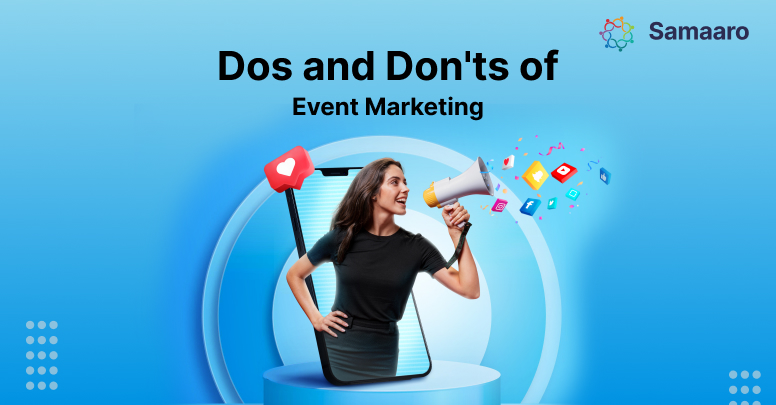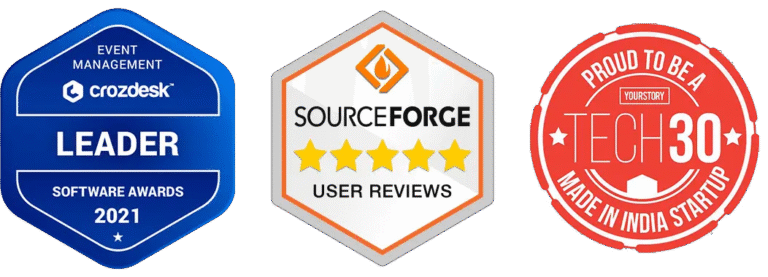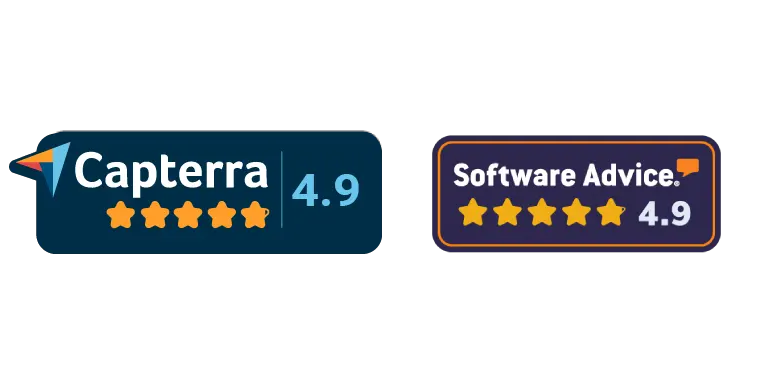Samaaro + Your CRM: Zero Integration Fee for Annual Sign-Ups Until 30 June, 2025
- 00Days
- 00Hrs
- 00Min

Marketing professionals recognise the significance of implementing successful tactics, and a startling 31% of them choose event marketing as their most effective tactic. Events stand as a fantastic opportunity to engage your audience, flaunt your brand, and generate extraordinary outcomes in this digital age where internet marketing rule the scene.
The fact that event marketing has numerous aspects and offers so many advantages speak volumes. The potential of events is limitless, from increasing brand exposure and encouraging customer interaction to generating valuable leads and educating both prospects and consumers.
However, as with any marketing endeavour, the outcome lies in the execution. A badly organised and carried out event may be disastrous, wasting resources, missing out on great possibilities, and perhaps tarnishing the brand’s reputation. On the other side, a well-designed event marketing plan may bring about a wealth of benefits, such as increased brand recognition, an upsurge in lead generation, and valuable consumer insights.
With so much at stake, it becomes paramount to navigate the world of event marketing with precision and tact. Therefore, let’s explore some of the vital dos and don’ts that might make or break your event marketing efforts.

The secret recipe to attract a roaring crowd lies in a mind-blowing event agenda. And guess what? Samaaro is here to empower you with the creative freedom to craft unforgettable event websites that set the stage on fire. With a plethora of stunning templates at your fingertips, you can effortlessly infuse the event with the perfect tone and vibe. Craft a well-balanced program that includes relevant topics, expert speakers, and interactive sessions. Interactive sessions, such as workshops, panels, and Q&A sessions, foster engagement and create a dynamic atmosphere. Attendees appreciate the opportunity to interact with speakers and fellow participants, making the event more memorable and valuable.
If you’re not actively participating in social media trends, you risk falling behind the times, as nowadays, being active on multiple platforms is the key to success. It’s important to share visually captivating content, such as event teasers, behind-the-scenes clips, and highlights of the speakers. Engaging with your followers and promptly responding to their queries helps build anticipation and fosters a sense of community surrounding the event. Using AI to create content AI can help you determine the best writing style and tone for session materials including presentation slides, handouts, and promotional text. Create a unique hashtag for your event to stand out, then urge attendees to use it when posting on social media. Promote tagging and run social media competitions as well to encourage sharing.
Generating FOMO (Fear of Missing Out) ahead of the event can greatly motivate attendees to participate. Employing pre-marketing tactics, such as providing early bird ticket promotions and exclusive discounts, creates a sense of urgency and encourages people to register early. This approach not only increases ticket sales but also allows you to gauge the initial interest in the event and make necessary logistical arrangements accordingly.
59% of marketers believe email is over twice as effective at generating leads than channels such as PPC and paid social media. Well, the researchers have laid out the importance to incorporate email marketing. Create a targeted email list by collecting contact information through website sign-ups, social media lead generation, and other avenues. Start by crafting engaging and personalized emails that cater to the recipient’s interests and needs. Share valuable content, event updates, and exclusive offers. Additionally, send reminders, last-minute details, and post-event follow-ups to maintain a positive relationship with your audience.
One of the most effective methods to maximize event marketing is by inviting last year’s attendees to the upcoming event. Not only that, but you can further encourage their participation by offering incentives and referral programs. Another smart approach is to start selling tickets for the next year’s event right after the conclusion of the current one, initiating early marketing efforts. Share exciting details about the future event to entice more and more people to join in the anticipation and excitement.

Consistency in branding is a key consideration if you want to leave a lasting impact on your audience. Make sure the logo, colour palette, and general design language of your event are consistent with your brand identity. Certain event planners could produce packed designs that overwhelm visitors and impede important information. Effective event marketing relies on clarity and simplicity. Focus on user-friendly designs while keeping it aesthetically appealing.
Attendee feedback is a treasure of useful information. Not getting feedback prevents you from knowing what went well and what needs improvement. Send questionnaires to attendees after the event to get their feedback on the event, the calibre of the sessions, and ideas for future events. Similarly, event analytics offer insightful data on attendee behaviour, engagement, and overall event success. There may be lost chances to improve future events if important indicators like registration rates, participant demographics, and session popularity are not monitored.
Although traditional advertising has its advantages, depending only on it may restrict the visibility and reach of your event. Employ digital marketing techniques like influencer collaborations, email campaigns, and social media advertising to reach a wider audience and generate more discussion about your event. An event marketing campaign’s success depends on finding the ideal mix between conventional and digital platforms. To increase attendance from a variety of demographics and increase the exposure of your event, combine the two tactics.
Missing out on post-event engagement might result in lost chances to develop relationships with attendees. Continue to engage with your audience through newsletters, webinars, or exclusive content related to the event’s themes. By staying in touch, you raise the possibility that they may back your brand by attending future events. Send them unique thank-you emails to show your appreciation for their involvement. Include the event’s highlights as well as any related materials or recordings. This action not only expresses gratitude but also encourages audience participation.
In conclusion, refining the art of event marketing demands striking a careful balance between creativity, planning, and foresight. You can make your events successful and leave a lasting impression on your audience by knowing the dos and don’ts.

Built for modern marketing teams, Samaaro’s AI-powered event-tech platform helps you run events more efficiently, reduce manual work, engage attendees, capture qualified leads and gain real-time visibility into your events’ performance.
Location


© 2026 — Samaaro. All Rights Reserved.